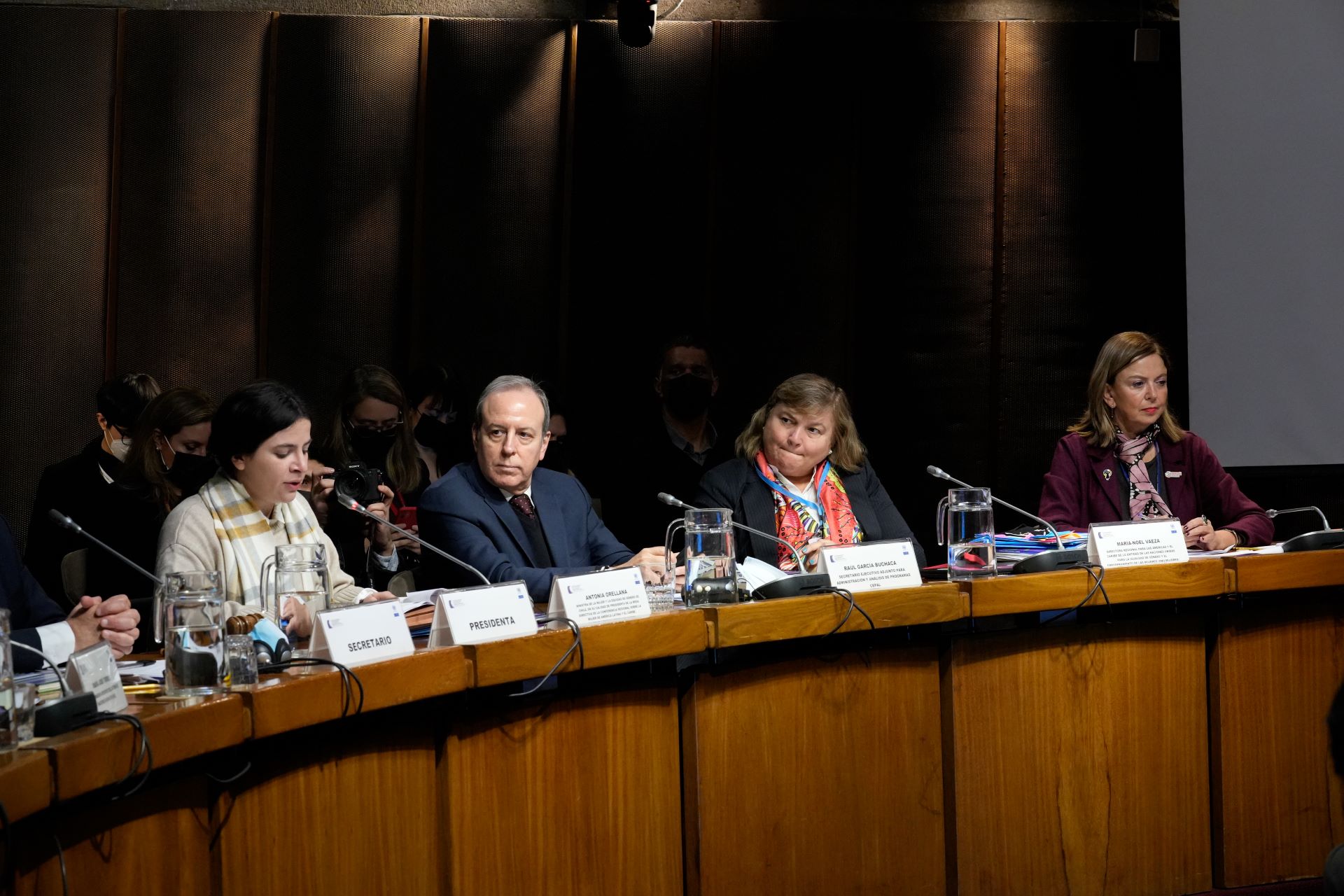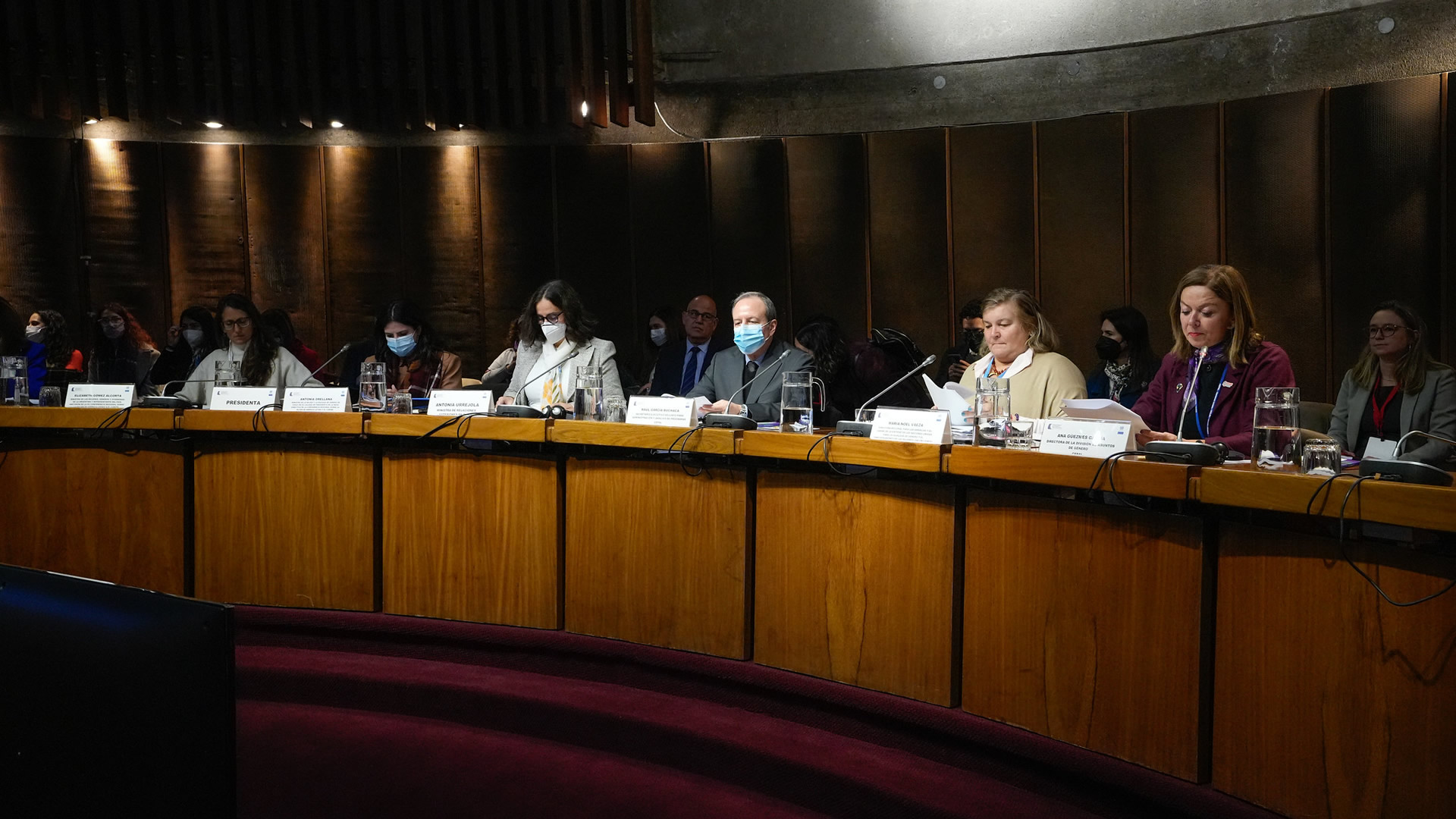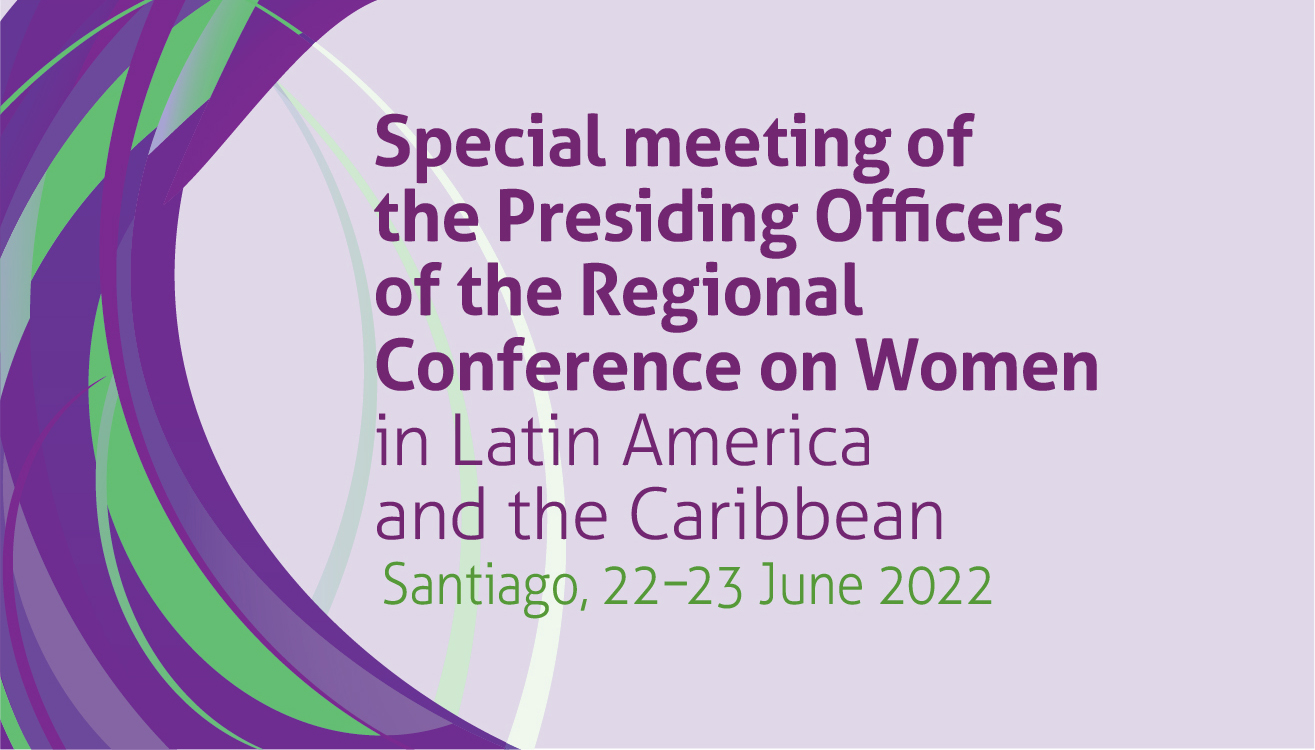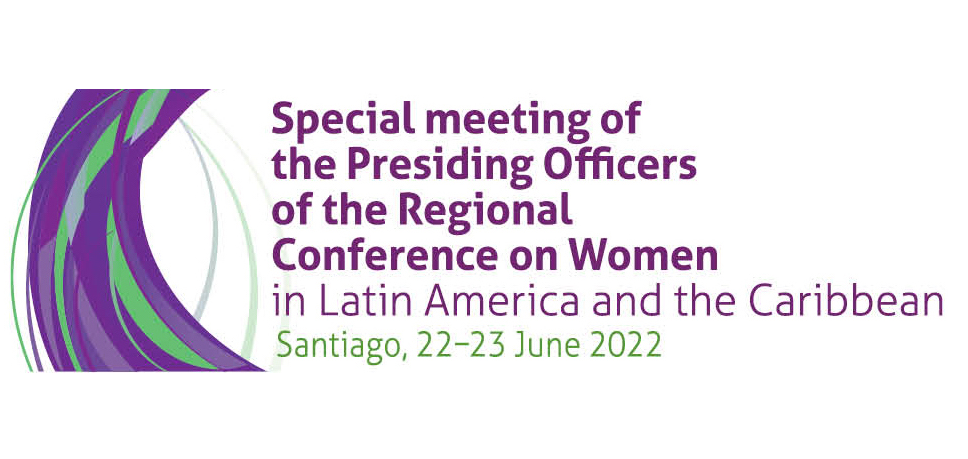Latin America and the Caribbean Must Move Towards a Care Society that Puts the Sustainability of Life and the Planet at the Center
Work area(s)
Women’s Affairs Ministers and representatives of international organizations, academia and civil society are participating in the Special Meeting of the Presiding Officers of the Regional Conference on Women in Latin America and the Caribbean, which was inaugurated today in Chile.

An emphatic call to avert setbacks on gender equality and women’s autonomy in today’s global crisis scenario and to move towards a care society in the region, which would put the sustainability of human life and of the planet at the center, was made today by authorities and international officials during the inauguration of the Special Meeting of the Presiding Officers of the Regional Conference on Women in Latin America and the Caribbean, which is being held under a hybrid format at the headquarters of the Economic Commission for Latin America and the Caribbean (ECLAC) in Santiago, Chile.
At the event – which spans two days and includes the participation of Ministers of Women’s Affairs and authorities from Mechanisms for Women’s Advancement in Latin American and Caribbean countries, along with representatives of international organizations, academia and civil society – attendees are examining the preparations for the XV Regional Conference on Women in Latin America and the Caribbean, to be held in Buenos Aires, Argentina on November 7-11, precisely with the main theme of “The care society: horizon for a sustainable recovery with gender equality.”
Participating in the opening session of the gathering – where the Regional Gender Agenda’s 45 years in existence is also being celebrated – were Raúl García-Buchaca, Deputy Executive Secretary for Management and Programme Analysis of ECLAC; María-Noel Vaeza, Regional Director for the Americas and the Caribbean of the United Nations Entity for Gender Equality and the Empowerment of Woman (UN Women); and Antonia Orellana, Minister of Women’s Affairs and Gender Equity of Chile, in her capacity as Chair of the Presiding Officers of the Regional Conference on Women in Latin America and the Caribbean. Subsequent to that, Ana Güezmes, Director of ECLAC’s Division for Gender Affairs, presented progress on the drafting of the XV Regional Conference’s position document.
Raúl García-Buchaca recalled that the crisis stemming from the COVID-19 pandemic “has deepened the structural constraints of gender inequality and limited women’s economic, physical and decision-making autonomy” in the region. For that reason, he highlighted the role that Chile is currently playing – as Chair of the Presiding Officers of the Conference – along with Argentina – as host of the XV Conference – in formulating gender equality policies from a feminist perspective, especially those geared towards building national care systems.
Latin America and the Caribbean is the only region in the world where a Regional Gender Agenda has been advanced for the last 45 years, serving as a guide for public policies, actions and decisions in our countries for promoting gender equality and sustainable development, ECLAC’s representative underscored.
“The theme of the XV Regional Conference on Women will be, precisely, how to move towards a care society where time, work, resources and power are redistributed. Because a sustainable recovery with gender equality is urgently needed. We need to change the course of this configuration that is based on inequality and adopt a different development pattern, one that would recognize people’s interdependence and put the sustainability of human life and of the planet at the center,” García-Buchaca affirmed.
María-Noel Vaeza, Regional Director for the Americas and the Caribbean of UN Women, likewise sustained: “Care is critical. If we do not have care systems, we are not going to have time to participate in politics or in the economy, or at the negotiating table, which is our right. We need academia, the private sector, civil society and, primarily, the political will of States. We hope this will be very present at the XV Regional Conference on Women.” In addition, she referred to the 45th Anniversary of the Regional Conference, emphasizing the strength of that intergovernmental space for regional cooperation, indicating: “I like to imagine a strong Regional Conference on Women, with vision and the steadfast determination to achieve goals and results as well as solutions, so that the governments of our region can put women at the center.”
In her remarks, Antonia Orellana, Minister of Women’s Affairs and Gender Equity of Chile, in her capacity as Chair of the Presiding Officers of the Regional Conference on Women, pointed up “the valuable and committed work that has been carried out for 45 years to make our Regional Gender Agenda a reality that transforms women’s lives, day by day.” This is a tool that requires political and financial backing for its fulfillment, she said, adding that “without it, these are agreements that never materialize.”
In the current, challenging context, Minister Orellana said “we identify setbacks in women’s rights, their autonomy and their economic empowerment” in the region, which means that “affirmative actions are needed in the area of fiscal, labor, productive, economic and social policies to protect the rights of women attained in the last decade, to avert setbacks and to tackle gender inequalities in a short, medium and long-term scenario in a context of growing delegitimization of democracy and multilateralism as possibilities for resolving day-to-day problems.”
Although ECLAC has reported a recovery in labor force participation in the region, it is very unequal. Only men will return to the participation levels seen prior to the crisis, while women are forecast to barely attain the labor participation rate recorded in 2008 (49.1%).
Because of the pandemic, the burden of care work in households – and especially for women – increased substantially. Before the pandemic, on average, women already spent triple the amount of time that men did on care work. The countries in the region that have measured the economic value of unpaid work in households (10) estimate that it represents between 15% and 27% of GDP, and that women are the ones contributing around 75% of that value.
The Regional Conference on Women in Latin America and the Caribbean is organized by ECLAC in coordination with UN Women. It is the main intergovernmental forum on women’s rights and gender equality in the region, and it meets every three years.
On Thursday, June 23, in the framework of the Special Meeting, a commemorative session will take place to mark the 45th anniversary of the First Regional Conference on the Integration of Women in the Economic and Social Development of Latin America, held in Havana, Cuba in 1977, and of the Regional Gender Agenda.
The Regional Gender Agenda encompasses the commitments to women’s autonomy and rights that the region’s governments have approved at the Regional Conferences on Women in Latin America and the Caribbean, and it is also fueled by the capacity, strength and creativity of women in the region and of women’s and feminist organizations.
Related content

Representatives Highlighted the Historic Contribution of the Regional Gender Agenda and Proposed Moving Towards a Care Society in Latin America and the Caribbean
Senior authorities, specialists and members of civil society participated in the Special Meeting of the Presiding Officers of the Regional Conference on Women in Latin America and the Caribbean,…

Women’s Affairs Ministers and High-level Authorities Will Commemorate the Regional Gender Agenda’s 45th Anniversary and Review Preparations for Regional Conference
On June 22-23, a Special Meeting of the Presiding Officers of the Regional Conference on Women in Latin America and the Caribbean will take place using a hybrid format.

Special meeting of the Presiding Officers of the Regional Conference on Women in Latin America and the Caribbean
The Special Meeting of the Presiding Officers of the Regional Conference on Women in Latin America and the Caribbean will take place in hybrid format (in person and virtually) at the headquarters of…
Related link(s)
Country(ies)
- Latin America and the Caribbean
Contact
Public Information Unit
- prensa@cepal.org
- (56 2) 2210 2040
